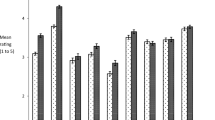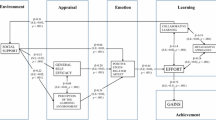Abstract
The quality of life of medical students and their motivation to learn are critical factors that have an impact on their ability to learn. The aim of this study was to investigate the associations between medical students’ perceptions of their quality of life, motivation to learn, and estimated grade at the end of the academic year. Two hundred and seventy-four medical students at years four and five of medical school participated in the study. Students filled in a demographic survey form, and shortened versions of the World Health Organization Quality of Life Questionnaire and the Motivated Strategies for Learning Questionnaire. Significant correlations between quality of life and motivation to learn measures were obtained. Second, students who scored high on aspects of quality of life and motivation to learn also scored significantly higher on estimates of written grade. In conclusion, the results suggest that medical students’ perceptions about quality of life and motivation to learn are linked to estimation of academic achievement. The findings of this study further resonate with a key conceptual model in the motivation literature, which promotes the importance of creating opportunities for mastery learning, engaging task value, producing optimal learning contexts, and creating mechanisms for coping with and managing the inevitable anxiety-provoking learning experiences that medical students face.
Similar content being viewed by others
References
Bramness JG, Fixdal TC, Vaglum P. Effect of medical school stress on the mental health of medical students in early and late clinical curriculum. Acta Psychiatrica Scandinavica. 2007; 84(4):340–5.
Misch D. Andragogy and medical education: are medical students internally motivated to learn? Adv. Health Sci. Educ. 2002; 7(2):153–60.
Hassed C, Lisle Sd, Sullivan G, Pier C. Enhancing the health of medical students: Outcomes of an integrated mindfulness and lifestyle program. Adv. Health Sci. Educ. 2009; 14(3):387–98.
Radcliffe C, Lester H. Perceived stress during undergraduate medical training: A qualitative study. Med. Educ. 2003; 37(1):32–8.
Ross S, Cleland J, Macleod MJ. Stress, debt and undergraduate medical student performance. Med. Educ. 2006; 40(6):584–9.
Srivastava K, Raju M, Saldanha D, Chaudhury S, Basannar D, Pawar A, et al. Psychological well-being of medical students. Med. J. Armed Forces India. 2007; 63(2):137–40. Retrieved from http://medind.nic.in/maa/t07/i2/maat07i2p.pdf.
Lonka K, Sharafi P, Karlgren K, Masiello I, Nieminen J, Birgegård G, et al. MED NORD-A tool for measuring medical students’ well-being and study orientations. Med. Teach. 2008; 30(1):72–9.
Owens J. Sleep loss and fatigue in medical training. Curr. Opin. Pulm. Med. 2001; 7(6):411.
Tanaka M, Mizuno K, Fukuda S, Tajima S, Watanabe Y. Personality traits associated with intrinsic academic motivation in medical students. Med. Educ.. 2009; 43(4):384–7.
Ruthig JC, Haynes TL, Stupnisky RH, Perry RP. Perceived Academic Control: mediating the effects of optimism and social support on college students’ psychological health. Soc. Psychol. Educ. 2009; 12:233–49.
Chow HPH. Psychological well-being and scholastic achievement among university students in a Canadian Prairie City. J. Soc. Psychol. Educ. 2007; 10(4):483–93.
The WHOQOL Group. The development of the World Health Organization Quality of Life Assessment Instrument (the WHOQoL). In: Orley J, Kuyken W, editors. Quality of Life Assessment: International Perspectives. Heidleberg: Springer-Verlag; 1994.
Pintrich PR. A conceptual framework for assessing motivation and self-regulated learning in college students. Educ. Psychol. Rev. 2004; 16(4):385–407.
Pintrich PR, De Groot EV. Motivational and self-regulated learning components of classroom academic performance. J. Educ. Psychol. 1990; 82 (1):33–40.
Schunk DH, Pajares F. Competence Perceptions and Academic Functioning. In: Elliott A, Dweck C, editors. Handbook of competence and motivation (pages 85–104). New York: Guilford; 2005.
Pintrich PR, Zusho A. Student motivation and self-regulated learning in the college classroom. In: Perry RP, Smart JC, editors. The scholarship of teaching and learning in higher education: An evidence-based perspective. Dordrecht, The Netherlands: Springer; 2007. p. 731–810.
Raj SR, Simpson CS, Hopman WM, Singer MA. Health-related quality of life among final-year medical students. CMAJ. 2000;162(4):509–10. http://www.cmaj.ca.ezproxy.auckland.ac.nz/cgi/reprint/162/4/509 [September 10, 2010]
Prins JT, Gazendam-Donofrio SM, Dillingh GS, van de Wiel HBM, van der Heijden FMMA, Hoekstra-Weebers JEHM. The relationship between reciprocity and burnout in Dutch medical residents. Med. Educ. 2008; 42:721–8.
Akins RB. Motivation of Asian Americans to study medicine: A pilot study. Academic Leadership. 2007;5(1). http://www.academicleadership.org/emprical_research/Motivation_of_Asian_Americans_to_Study_Medicine_A_Pilot_Study.shtml [August 4, 2010]
The WHOQOL Group. Development of the World Health Organization WHOQOL-BREF quality of life assessment. Psychol. Med. 1998; 28(3):551–8.
Billington R, Landon J, Krägeloh CU, Shepherd D. The New Zealand World Health Organization Quality of Life (WHOQOL) Group. N Z Med. J. 2010; 123 (1315):65–70.
Ferguson E, James D, Madeley L. Factors associated with success in medical school: Systematic review of the literature. BMJ. 2002; 324:952–7.
Pelaccia T, Delplancq H, Triby E, Bartier J-C, Leman CC, Dupeyron J-P. Impact of training periods in the emergency department on the motivation of health care students to learn. Med. Educ. 2009; 43(5):462–70.
Rieber N, Betz L, Enck P, Muth E, Nikendei C, Schrauth M, et al. Effects of medical training scenarios on heart rate variability and motivation in students and simulated patients. Med. Educ. 2009;43(6):553–6.
Armstrong D, Ashworth M. When questionnaire response rates do matter: A survey of general practitioners and their views of NHS changes. Brit. J. Gen. Pract. 2000; 50:479–80.
The University of Auckland: Faculty of Medical and Health Sciences. Undergraduate study at the FMHS.; 2009 [updated July 2; cited 2009 November 24]. Available from: http://www.fmhs.auckland.ac.nz/faculty/undergrad/default.aspx.
Davis C, Thake J, Vilhena N. Social desirability biases in self-reported alcohol consumption and harms. Addictive Behav. 2010;35(4):302–11.
Hodgson C, Teherani A, Guiton G, Wilkerson L. The relationship between student anonymity and responses from two medical schools on the Association of American Medical Colleges’ Graduation Questionnaire. Acad. Med. 2002;77(10):S48–S50.
Murphy B, Herrman H, Hawthorne G, Pinzone T, Evert H. Australian WHOQOL Instruments: User’s manual and interpretation guide. Melbourne: Australian WHOQOL Field Study Centre; 2000.
Field A. Discovering statistics using SPSS. 2nd ed. London: Sage; 2005.
Ohsako T, Sawano Y. The situation in Japan. In: Tikkanen T, Nyhan B, editors. Promoting lifelong learning for older workers: An international overview (pages 90–107). Luxembourg: Office for Official Publications of the European Communities 2006.
The WHOQoL Group. The World Health Organization quality of life assessment (WHOQOL): Development and general psychometric properties. Soc. Sci. Med. 1998; 46(12):1569–85.
White CB, Gruppen LD. Self-regulated learning in medical education. Edinburgh: Association for the Study of Medical Education (ASME); 2007.
Boekaerts M. Being concerned with well-being and with learning. Educ. Psychol. 1993; 28:148–67.
Henning MA, Hawken SJ, Hill AG. The quality of life of New Zealand doctors and medical students: What can be done to avoid burnout? New Zealand Med J. 2009;122(1307):102–10.
Choi N. Self-efficacy and self-concept as predictors of college students’ academic performance. Psychol. Schools. 2005; 42(2):197–205.
Marsh HW. Causal ordering of academic self-concept and academic achievement: a multiwave, longitudinal panel analysis. J. Educ. Psych. 1990; 82(4):646–56.
Rodriguez C. The impact of academic self-concept, expectations and the choice of learning strategy on academic achievement: the case of business students. High. Educ. Res. Develop. 2009; 28(5):523–39.
Turner JL, Dankoski ME. Objective Structured Clinical Exams: A Critical Review. Fam. Med. 2008; 40(8):574–8.
Ford-Gilboe M, Laschinger HKS, Laforet-Fliesser Y. The effect of a clinical practicum on undergraduate nursing students’ self-efficacy for community-based family nursing practice. J. Nurs. Educ. 1997; 36:212–9.
Jackson JW. Enhancing self-efficacy and learning performance. J. Experiment. Educ. 2002; 70(3):243–54.
Margolis H, McCabe PP. Self-efficacy: A key to improving the motivation of struggling learners. Prevent. School Failure. 2003; 47(4):162–9.
Opacic DA. The relationship between self-efficacy and student physician assistant clinical performance. J. Allied Health. 2003; 32(3):158–66.
Pintrich PR. A motivational science perspective on the role of student motivation in learning and teaching contexts. J. Educ. Psychol. 2003; 95(4):667–86.
Author information
Authors and Affiliations
Corresponding author
Rights and permissions
About this article
Cite this article
Henning, M.A., Krägeloh, C.U., Hawken, S.J. et al. Motivation to Learn, Quality of Life and Estimated Academic Achievement: Medical Students Studying in New Zealand. Med.Sci.Educ. 21, 142–150 (2011). https://doi.org/10.1007/BF03341611
Published:
Issue Date:
DOI: https://doi.org/10.1007/BF03341611




